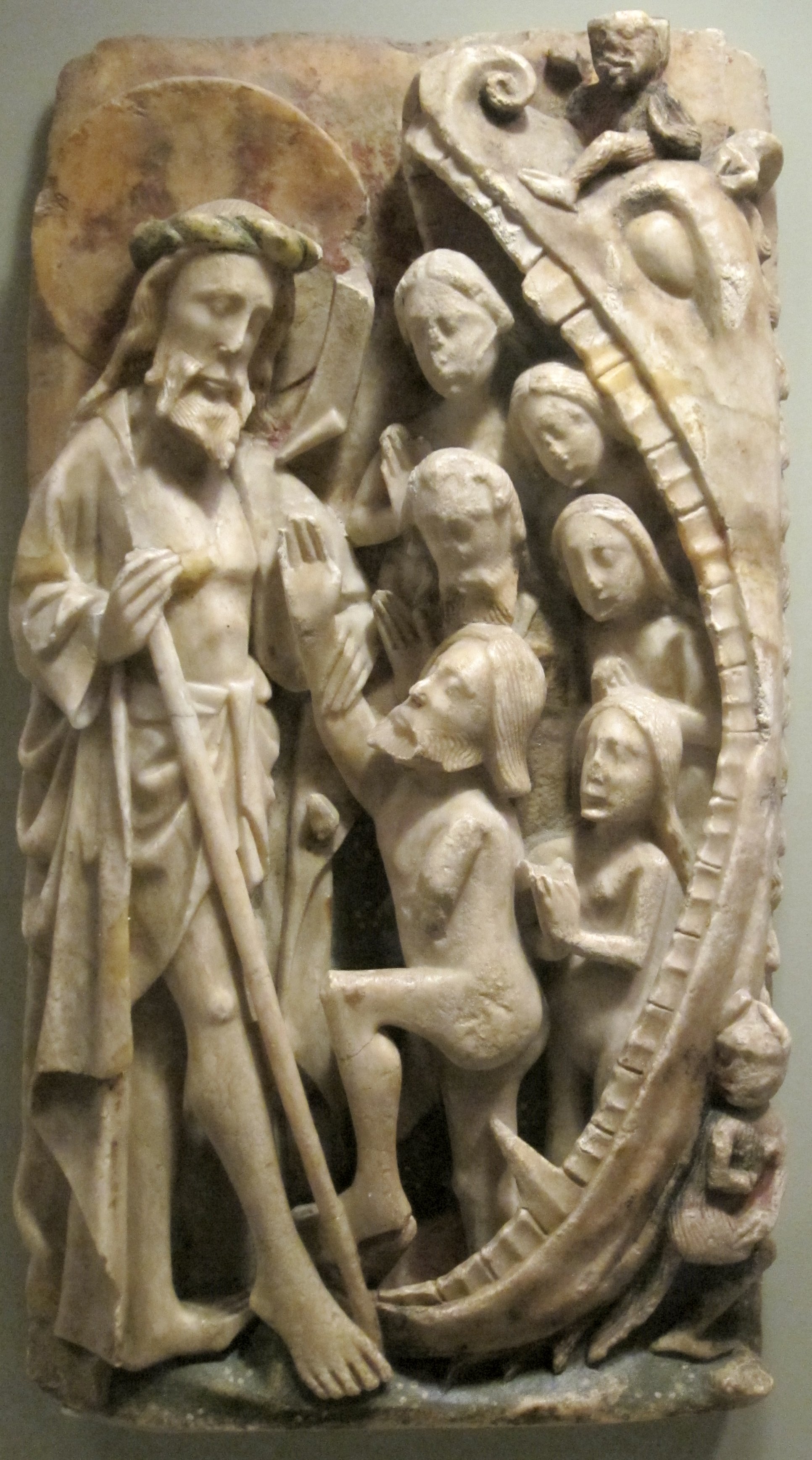 |
| Harrowing of Hell (15th c.) |
The Apostles’ Creed declares that Jesus “was conceived by the Holy Spirit, born of the Virgin Mary, suffered under Pontius Pilate, was crucified, died and was buried. He descended into hell. On the third day, He rose again from the dead. He ascended into heaven, and is seated at the right hand of God the Father almighty. From there He will come to judge the living and the dead.” I’ve explained before that this descent into hell refers not to damnation, but to Christ liberating the souls of the righteous from Sheol, in what’s known as the harrowing of hell, and that this harrowing of hell is solidly Biblical.
But increasingly, leading Evangelicals now reject this part of the Creed, as the Washington Post reports in a very well-written piece:
On Good Friday, Jesus told the Good Thief crucified alongside him that “today you will be with me in paradise,” according to Luke’s Gospel. “That’s the only clue we have as to what Jesus was doing between death and resurrection,” John Piper, a prominent evangelical author and pastor from Minnesota, has said. “I don’t think the thief went to hell and that hell is called paradise.”[…]Wayne Grudem, a former president of the Evangelical Theological Society, says the confusion and arguments could be ended by correcting the Apostles’ Creed “once and for all” and excising the line about the descent.
“The single argument in its favor seems to be that it has been around so long,” Grudem, a professor at Phoenix Seminary in Arizona, writes in his “Systematic Theology,” a popular textbook in evangelical colleges. “But an old mistake is still a mistake.”
Grudem, like Piper, has said that he skips the phrase about Jesus’ descent when reciting the Apostles’ Creed.
 |
| John Piper |
Taylor Marshall, over at Called to Communion, does a great job rebutting Piper’s claim that Luke 23:43 is the “only clue we have” as to what Jesus did on Holy Saturday. Marshall marshals passages like Ephesians 4:9, Acts 2:24, and 1 Peter 3:19, and prophetic passages like Hosea 13:14 and Zech 9:11, and explains that Piper is ripping the phrase “paradise” out of its proper Jewish context.
I’d add John 20:17, in which Christ explicitly says, on Easter Sunday, that He has not yet Ascended. This seems to foreclose Piper’s idea that Easter Sunday involved Christ descending from Heaven, rather than rising from Sheol. So, too, does all of the Scriptural language about Christ’s “rising” (Mark 9:9-10, 1 Thessalonians 4:14, etc.). And if Piper’s view is right, the “Second Coming” has already occurred: that is, he thinks Christ came down from Heaven in the Incarnation, returned to Heaven on Holy Saturday, and came down to Earth a second time on Easter. Thus, we wait in hopeful anticipation of His Third Coming, I suppose.
What makes all of this more bizarre is that Piper’s own website contains “A Baptist Catechism (adapted by John Piper,” which closes with a recitation of the Lord’s Prayer, the Apostles’ Creed (including the phrase he now rejects), and the Ten Commandments. That is, Piper apparently hand-picked this Creed to include in his personal Catechism, yet he doesn’t even believe it?
It gets weirder. A few year back, Piper was asked, “Is there a place for creeds in the church?” He responded quite eloquently, by explaining why we need the Creeds to prevent “Bible Only” Christians from becoming heretics:
Icon showing the Council of Nicea condemning Arius I think they have a really important place. But they aren’t to be a replacement for the Bible and they shouldn’t be given equal authority to the Bible. Rather, they are to be considered faithful expressions of the Bible.
We need faithful expressions of the Bible—both those written for our generation and those preserved from other generations.
I’m currently studying the battle surrounding the deity of Christ in the third and fourth century, which involved Athanasius and his heretical opponent Arias. What I’m learning is that the use of biblical language was a huge tactic for those who were departing from biblical truth!
That means that to say that you are a “Bible only” person might just mean that you’re a heretic. In other words, you can use biblical texts to justify false things. [….]
A person who considers himself a “Bible only” person could believe anything. Therefore we need creeds (affirmations of faith) to see clearly how people are reading the Bible. Are they reading error into the Bible? Or are they drawing truth out of the Bible?
To suggest that we get rid of all creeds and just have the Bible is simply to allow people to think loosely about what the Bible says and not require that we come to terms with what it really means.
What more needs to be said? He’s right: rejection of the Creeds is simply acceptance of heresy. And yet… he rejects the very Creed he’s previously endorsed, based on his misinterpretation of a single verse, Luke 23:43. He’s shown, really eloquently, why his own views should be rejected.
But let’s step back and ask the bigger questions.
 |
| St. Ignatius Defeating Heresy |
- If Piper is free to do this, and remain an orthodox Christian, what parts of the Creed can’t be rejected?
- As he’s noted, the Arians were able to use the Bible to justify their rejection of the Trinity. If Piper’s not bound by the Creed, why should Arius be? Do we need some sort of Appendix to the Creed, to say which parts we’re really serious about as Christians, and which parts we think are open for further debate?
- From a Protestant standpoint, do the Creeds have any binding authority whatsoever?
- If they do, how can one justify rejecting Christ’s descent into Hell? Or, for that matter, belief in the Holy Catholic Church that the Apostles’ Creed proclaims faith in?
- And if the Creeds don’t have any binding authority, but are just a statement of what one group of Christians happens to believe, why bother? Particularly if the people praying those Creeds omit or reject parts of the Creed they’re praying, as Piper apparently does, what purpose do these spineless Creeds possible serve?
Increasingly, the choice is clear: either accept Creedal Christianity, which involves belief in One Holy Catholic and Apostolic Church (as the Nicene Creed declares), or reject it, and enter the world of theological anarchy and rampant heresy that Piper both warns against and invites us to.


It’s interesting that he puts the Apostle’s Creed between the Lord’s prayer and the Ten Commandments, as if they all bear equal weight.
“The heretics demanded “no creed but the Bible” precisely so that they could use biblical language to evade biblical truth.” –John Piper http://www.desiringgod.org/resource-library/taste-see-articles/thoughts-on-the-sufficiency-of-scripture
Awfully convenient, isn’t it?
It really is funny how inconsistent he is:
Bad John Piper refuses to submit creeds: “Piper, has said that he skips the phrase about Jesus’ descent when reciting the Apostles’ Creed.”
Good John Piper recites a litany of horrors resulting from refusing to submit to creeds: “[I]n 1719 over a hundred Presbyterian, Congregational, and Baptist ministers gathered in London to deal with the problem that some ministers, after reading Samuel Clark, refused to sign the Trinitarian creeds of their denominations. They had become essentially Arian. What was the key issue? “The technical issue was whether it was enough for ministers to promise to follow only the Scriptures” (Mark Noll, The Rise of Evangelicalism [Downers Grove, Ill.: InterVarsity Press, 2003], p. 43). The Arians insisted on “no creed but the Bible,” or no language but Bible language. The vote was 57-53 against traditional Trinitarians. Again a form of the “sufficiency of Scripture” had been used to undermine the truth of Scripture.”
W/R/T Question no. 1: “Penal Substitutionary Atonement”. Duh.
Grudem: “I’m thankful that believers who differ on the issue of baptism can still have wonderful fellowship with one another across denominational lines, and can have respect for each other’s sincerely held views. I certainly do not put the question of baptism in the same category as the denial of penal substitutionary atonement which you mentioned [yesterday] because that seems to me to be a denial of the heart of the Gospel. And, as I mentioned, it seems to me that evangelical feminism involves, implicitly at least, a denial of the authority of the Bible. But differing views on baptism or the millennium do not have serious consequences of that type”
snort
Does he really not know when the substitionary atonement theory was devised?
Yea. I mean surely he does, which makes the whole ordeal weirder. He is condemning the entirety of Christendom prior to the reformation as denying “the heart of the Gospel.” You’d think the Middle Church Argument would be hard to avoid if you took that position. Maybe he buys into Baptist Successionism.
I was just looking over his baptist catechism and noticed in the Apostle’s Creed that he has it saying “the holy CHRISTIAN Church” rather than “the holy CATHOLIC Church” – so he’s already changed it
It is literally impossible not to change it as a Protestant – you can wiggle around it all you want, it still is implied that by reciting the Creed in original form you are intending that meaning of Catholic that the Church meant in the third, fourth, fifth centuries, etc, which was the visible institution convening infallible councils, etc. Just a wee bit too Catholic to be comfortable, methinks, so we gotta get out our box-cutters, remove somewhere between seven and eleven books from our Bibles (and more if we really need to), and just burn the Creedal Statements because they baffle our brains and turn us in circles contradicting ourselves over the authority of Sacred Tradition and the authority that the historical (read: Catholic) Church has when it finds a particular meaning.
Oh wait, that would turn us into heretics. Uhoh.
I particularly loved how he sanitized what amounts to an authoritatively Catholic reading of the Bible throughout history to a flat and vague “how the Bible’s been read.”
I left the PCUSA when they wanted “Mother, Womb, Child” to replace the Trinity.
I left Piper/Sproul/Driscoll Calvinism when (thanks to my wife, Joe, and some friends) I discovered that maybe…just maybe…Christians in 150 AD might know more about what the Apostles taught than Calvin in the 16th century.
Glad I’m not looking back…
Instead of tearing down Piper, how about building up the church?
I don’t see how these are mutually exclusive. Admonishing sinners is one of the works of mercy. Don’t you think admonishing those in earnest, but serious, theological error is also a good thing? What am I missing?
What about if he denied the Trinity or the deity of Christ? Would you say the same thing? At what point does incorrect doctrine become important enough to need correction?
It’s all relative, Restless Pilgrim. It’s all about the frog in the boiling water – ‘how alarmed does it make me, the Protestant, feel?’ It’s obvious that within Protestantism that’s the case, because you see this gradual de-evolution away from orthodoxy. It’s only a matter of time before *everything* gets questioned.
And that’s why I’m Catholic.
I attended his Church right before I decided to become Catholic and so do several of my friends. I’m glad I found the full truth and I pray that Piper and my friends will, too. That being said, I don’t doubt any of their love for Christ, they’re just a little misguided. If I could find my way, so can they (all with God’s help of course)!
Amen to all of that. I don’t think Piper is evil, but I do think that he needs to be called out when he’s leading people astray (and leading people away from the Apostles’ Creed is definitely leading people astray).
Very true.